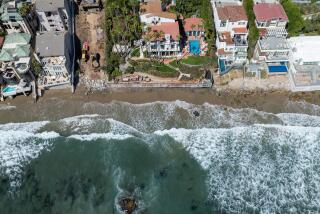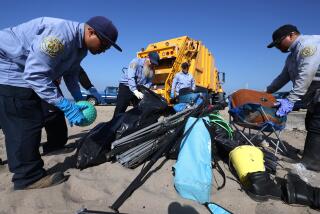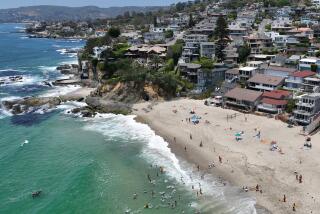Most Popular Beach Activity Appears to Be . . . Littering
- Share via
There are too many butts on the beach, and Mike Beuerlein thinks it’s disgusting.
He means discarded cigarette butts, by far the single-most common piece of garbage polluting Orange County’s shoreline last September, when the 11th annual International Coastal Cleanup took place.
There was more. Besides more than 14,800 cigarettes, volunteers cleaned up 62 syringes, 60 tampon applicators, 60 condoms and more than 45,000 other trash items.
“That’s disgusting. That’s depressing,” said Beuerlein, a marine safety lieutenant at Huntington City Beach. “On the other hand, I guess it’s pretty awesome that we could get that many people in Orange County to volunteer to clean up that much.”
The figures were released Thursday by the Center for Marine Conservation, the Washington, D.C.-based nonprofit group that helped lead the cleanup. More than 151,000 volunteers nationwide and more than 1,000 volunteers locally removed a total of 2.9 million pounds of trash.
Nearly all the garbage can be traced to a handful of sources, said center spokesman David Hall: People dumping garbage into storm drains, rivers and other areas that drain into the ocean, treatment systems that fail and people who simply leave their garbage behind after a day of soaking up the sun.
“I guess people can be having so much fun at the beach that they forget about cleaning up after themselves,” Hall said. “And people forget that all things are connected to the ocean. Dump stuff in a storm drain, and that connects with lakes and rivers and the ocean.”
But others weren’t as generous about people’s motives.
“There’s a general lack of respect for nature,” Beuerlein said. “Some people are not willing to walk a few extra yards to put stuff in the trash can.”
“People can be bozos,” said surfer Gordon LaBedz, who participated in last year’s cleanup and recalls picking up his fair share of fast-food remains, plastic cups--and the many syringes that automatically came to his attention because he is a physician. “This is the filth I surf and swim in every day.”
*
Volunteers using rubber gloves, rakes and other tools collected trash in plastic bags. Volunteers also carried a chart and were asked to specify and categorize each item collected, Hall said.
Items were then properly disposed and recycled, Hall said. Some of the more unusual items found nationwide included a body on the shore of a Michigan lake, a wedding ring whose owner has not yet been located and a losing lottery ticket.
Hall said he hopes the results of the survey shock people and make them think about their actions. Trash can especially pose a health hazard to animals. Stories abound of sea life being caught and killed in plastic fishing lines and six-pack holders, Hall said.
“Unfortunately, the debris we can see indicates that there’s a lot there that we don’t see,” said Hall, whose group is dedicated to preserving marine life and its ecosystems and habitats. “And that’s scary.”
(BEGIN TEXT OF INFOBOX / INFOGRAPHIC)
Waves of Trash
The 15 items most often picked up in Orange County during the 11th annual International Coastal Cleanup:
Cigarette butts: 14,857
Miscellaneous foam pieces: 8,216
Pieces of plastic: 4,783
Pieces of paper: 3,574
Straws: 3,558
Plastic caps/lids: 3,253
Plastic food bags/wrappers: 2,909
Pieces of lumber: 1,525
Pieces of foam plastic packing: 1,167
Foam plastic cups: 1,029
Glass pieces: 1,007
Other foamed plastic: 997
Bottle caps: 935
Plastic cups/utensils: 901
Balloons: 885
Source: Center for Marine Conservation
More to Read
Sign up for Essential California
The most important California stories and recommendations in your inbox every morning.
You may occasionally receive promotional content from the Los Angeles Times.











